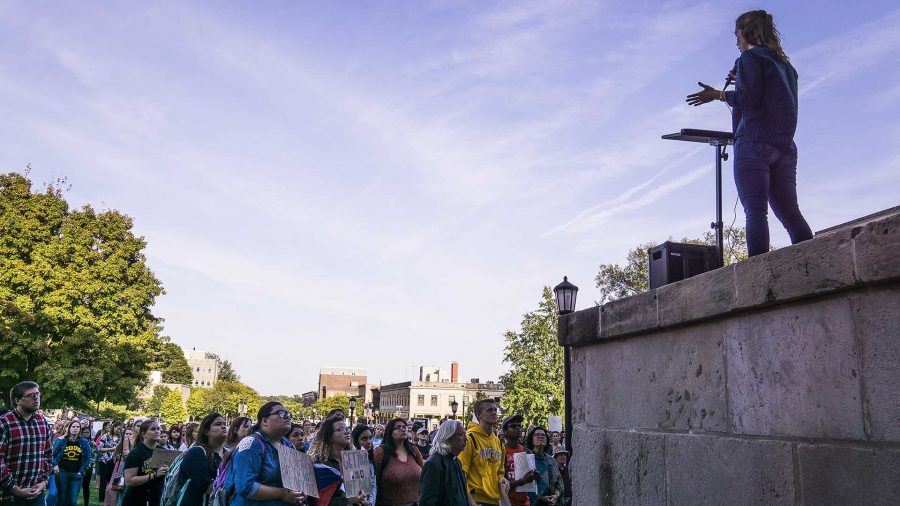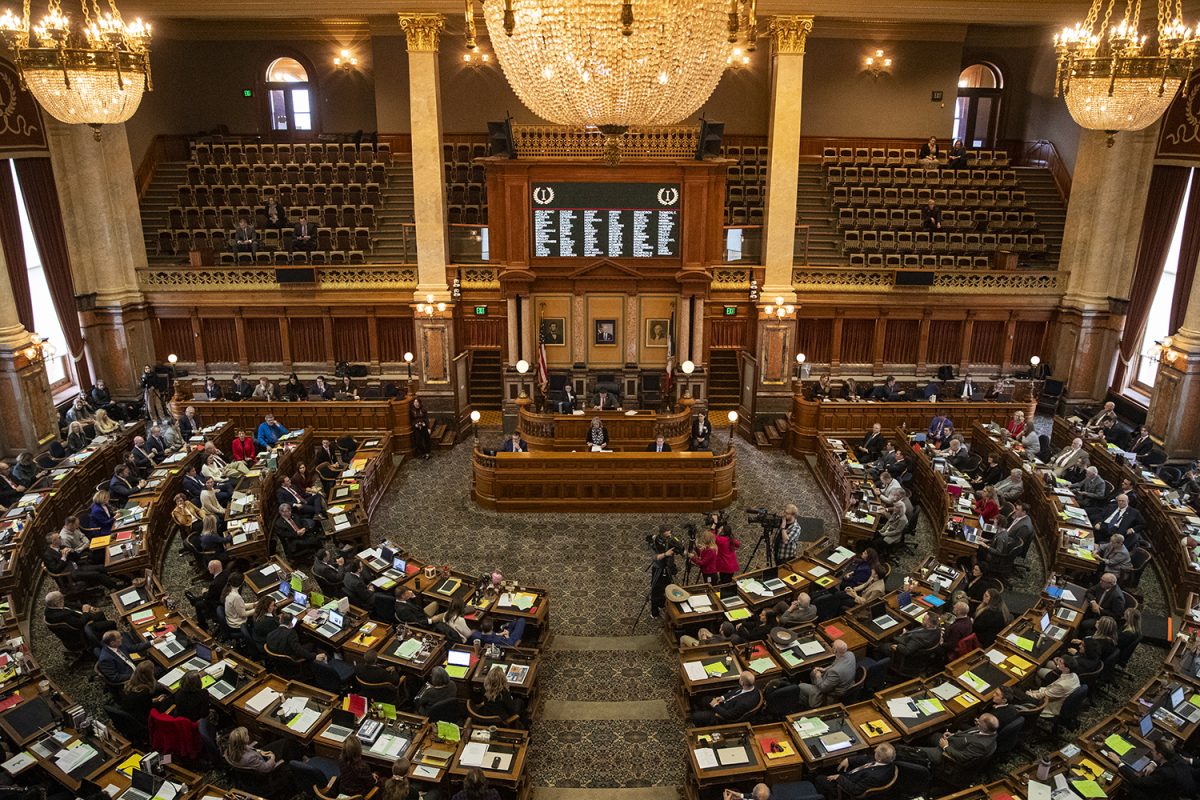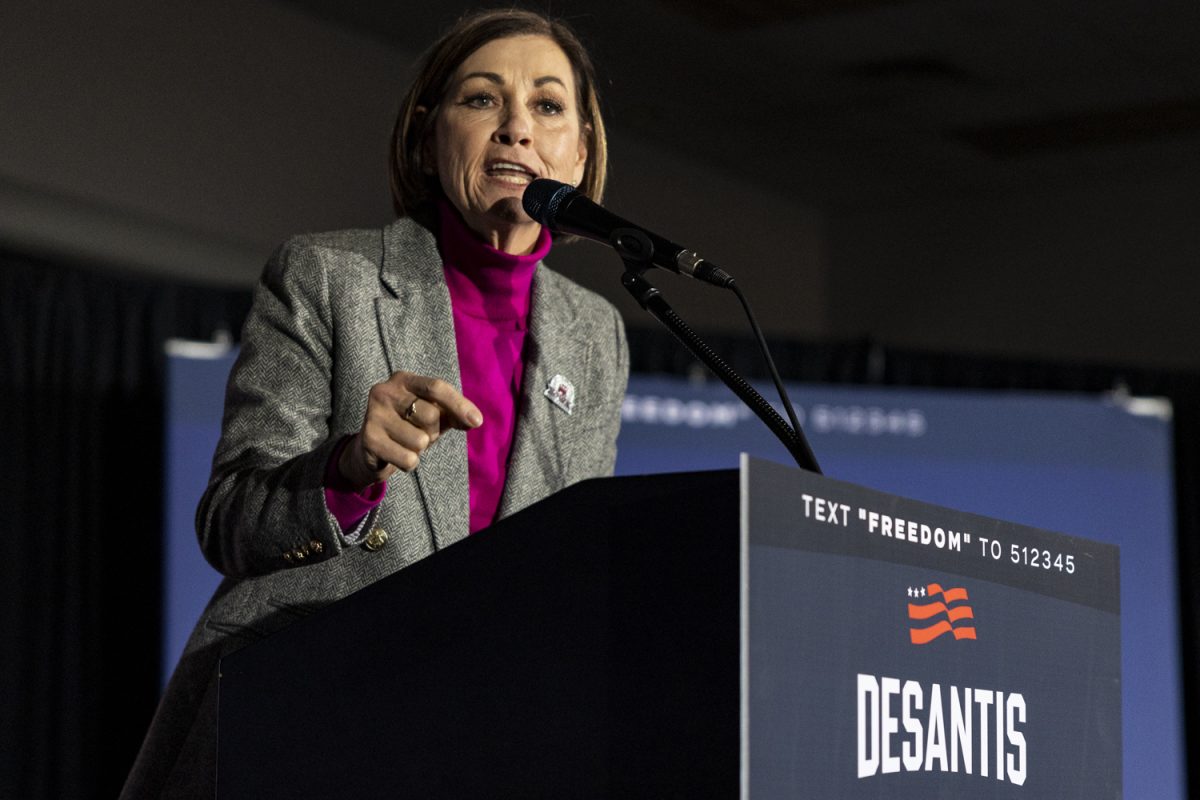On the afternoon of Sept. 8, an anonymous University of Iowa junior and recipient of Deferred Action for Childhood Arrivals sat down with The Daily Iowan to talk about how the policy has affected her and what she thinks should come next in immigration reform.
She found out about her undocumented status while applying for seventh grade in Chicago’s system of selective-enrollment schools.
“I was filling out my forms, and it asked for a Social Security number,” she said. “I was looking around for it, and I was like, ‘OK, maybe it got lost somewhere, maybe they put them with my sister’s documents, something happened.’ “
She asked her parents about her Social Security when they got home from work; that’s when they told her she didn’t have one because she wasn’t born in the U.S.
She applied for DACA her sophomore year of high school in 2012 — the same year the policy was announced.
RELATED: DACA affects UI Community
DACA is an application process, she said.
The application fee is $465. Applicants have their fingerprints taken, cannot have a criminal record, and must have arrived in the U.S. before the age of 15. Recipients are eligible for a driver’s license, worker’s permit, and a Social Security number.
“[DACA] was definitely a light of hope. But at the same time, what if this was a trap? What if they’re just using this to get people’s information?”
She was in class when she found out on Sept. 5 the government would rescind DACA.
“I remember coming out … and I just sat down and cried. My ultimate goal was to be a doctor,” she said. “Once my DACA expires, which would be right after graduation, I wouldn’t be able to apply to med school.”
In a Sept. 5 interview with the DI, UI President Bruce Harreld said the UI opposes the withdrawal of DACA.
“… We don’t think this is a good thing to do,” he said. “I’ve expressed my concern directly to the administration through various letters.”
On Sept. 5, Harreld signed on to an Association of American Universities letter calling for congressional action ensuring that DACA recipients will be able to stay in the U.S. without being deported. He has also signed onto two letters in the past.
Harreld encouraged people to reach out to the UI for support.
“… Anybody who has any specific needs: Come see us; we’re here to help,” he said.
UI Student Government leaders also released a statement last week supporting undocumented students.
RELATED: UI community stands in solidarity with DACA students
“I always wanted to think it wasn’t going to happen,” the anonymous student said about shutting down DACA.
She said she used to feel protected, knowing she could attend class and visit home knowing nothing would happen to her. She was planning to visit home over the weekend but changed her mind.
“If I do go home, it’s going to be in a car ride with a friend, because any place immigration can come up, and now we’re not protected against deportation,” she said.
She said her two greatest fears are being sent back to a country and culture she doesn’t know and ICE going after her parents.
“I came to the U.S. when I was about 6 … from Ecuador,” the anonymous UI student told the DI. “I moved to Chicago, and that’s basically where I lived all my life.”
She has very few memories of Ecuador.
“I really don’t remember much. I remember bits and pieces here and there, but not really …” she said. “Most of my life has been here.”
The anonymous student’s younger sister was born in the U.S., and she would be left behind if their parents were deported.
Carla Gonzalez, a fourth-generation Mexican-American graduate student from Illinois studying leadership-policy studies, said many people don’t realize Latinx families are multigenerational.
“So even if they are citizens, they could have family members that are undocumented, and that’s not something people really take into consideration,” she said.
The anonymous UI student said she’s the eldest of her generation.
“I do have one younger cousin, who I believe is 10 or 12, who also was brought here when he was 11/2,” she said. “I have a couple cousins that live out of the state; they’re around my age. They were covered with DACA, and unfortunately, that’s not the case anymore.”
She said she worries for her younger relatives the most, because of the opportunities they’ll miss out on.
“I was able to attend some school, and for what it looks like I’ll be able to graduate from college. But for my little cousin, he wouldn’t be able to go to school, he wouldn’t be able to get a job,” she said. “If he finishes high school, that would be it for him.”
Last week, the American Civil Liberties Union of Iowa released statistics placing the number of DACA recipients in Iowa at just under 3,000.
In an email to The Daily Iowan on Sept. 8, Veronica Lorson Fowler, the communications director for the Iowa ACLU, said the petition recently signed by Iowa Attorney General Tom Miller about the end of DACA contains better numbers.
According to the petition, “As of March 31, 2017, USCIS had approved approximately 2,798 initial DACA applications and 2,780 renewals for residents of Iowa, for a total of 5,578. … One expert estimates that of that total, at least 2,434 DACA grantees currently work in Iowa’s economy.”
In the six months before DACA’s withdrawal takes effect, the anonymous UI student said, she would like to see something similar to it, or more permanent, put in place.
“Maybe a path to citizenship, if it’s not too much to ask for,” she said.
She said the Development, Relief, and Education for Alien Minors Act is a fair proposition.
“They were requiring a person under an eight-year [probation] period to either attend higher education, or still be involved in school, or have worked two years, or have been in the military for two years … and having kept a clean criminal record,” she said.
She said she is hopeful Congress will pass some form of legislation in time.
“If you look at what has been going on in Congress, a lot of Republicans are pushing for something to help DACA students,” she said. “I really hope that something good is going to come out of this.”
At the local level, she said, it is important for people to ask local authorities not to operate in participate with U.S. ICE.
The Iowa City City Council passed a resolution in January reaffirming local law enforcement’s role as public safety, not the execution of federal immigration law.
RELATED: Council addresses immigration
“Of course, a proclamation isn’t enough,” City Councilor Pauline Taylor said. “You have to stand behind that.”
Iowa City also recently joined dozens of cities, organizations, and counties across the country that have signed on to a Chicago lawsuit opposing new federal grant regulations.
The regulations would withhold federal public safety grants received by cities and states unless they enforce federal immigration law.
RELATED: Iowa City joins nationwide movement to keep immigration enforcement federal
Iowa City School District Superintendent Stephen Murley voiced support in a Sept. 7 statement for families and students affected by the withdrawal of DACA and promised the district would not give out immigrant-status information.
“To all of our students who are impacted by this decision — and to their friends, classmates, and teachers who are also concerned … know that the Iowa City Community School District stands by you,” the statement read.
The statement also encouraged people to reach out to school counselors and student and family advocates for assistance.
At a Sept. 7 rally on the Pentacrest, members of the Iowa Legal Clinic specializing in immigration law urged undocumented students to contact an immigration attorneys immediately.
The clinic is free for UI students and offers advice and consultation services.
“Depending on when your DACA expires, you may be able to renew, and all renewal applications must be filed before Oct. 5,” one unidentified member of the clinic said.
RELATED: Pentacrest protesters rally to support DACA
Although the anonymous UI student was able to renew her DACA a few months ago, and she will be able to remain in the U.S. to get her degree at the UI, she says she has friends at home whose permits will expire right after the March 5 deadline.
“DACA affects so many children, and in a lot of cases it wasn’t their choice to come here,” said Autumn Tallman, a UI freshman from Des Moines. “In my mind, they’re Americans just as much as anybody else is American. And I think it’s unconstitutional to deport Americans.”










